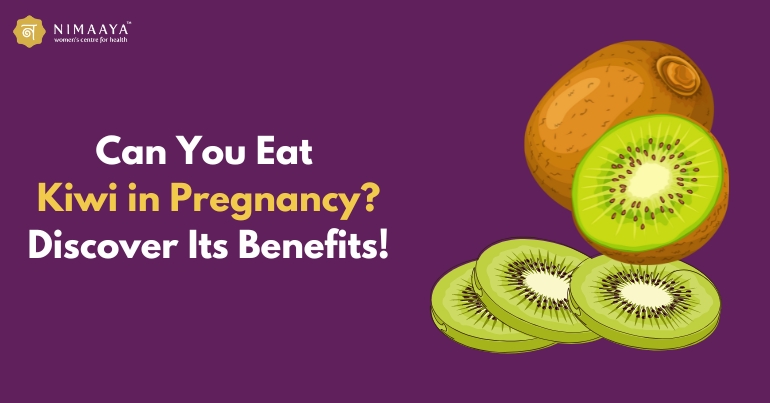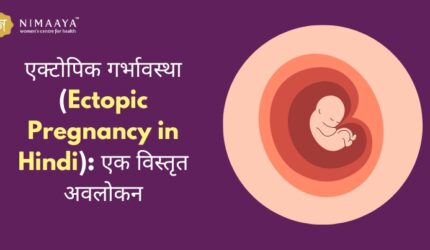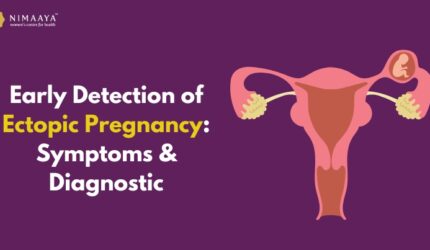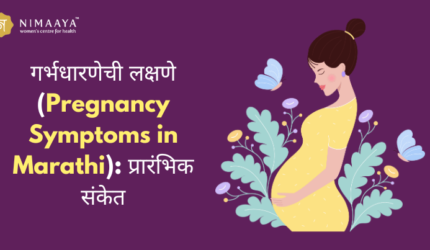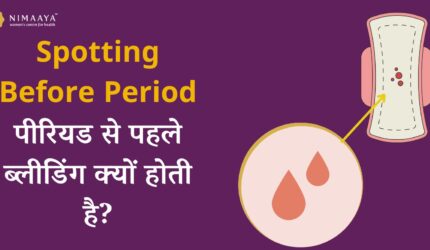Kiwi is a fruit that, owing to its vitamin, mineral and antioxidant richness, can serve as the best supplement in a pregnant woman’s diet. This time is significant for the mother and the fetus, and nutrition is the most crucial factor in maintaining a healthy pregnancy. Kiwi fruits benefits are fully loaded with all health nutrients for pregnant women, ranging from fetal development benefits to those for digestive health and immunity.
As part of this article, we shall discuss the nutritional value of kiwi, possible health benefits associated with kiwi in pregnancy, possible side effects and concerns, along with recommendations on how to include this fruit in the diet during pregnancy.
Nutritional Value of Kiwi in Pregnancy
Most importantly, kiwi fruits are bright green all over and possess a special sort of sweet-tangy taste. It is a tiny fruit but a lot of stuff within it in nutritional terms. There are other equally vital nutrients such as:
Vitamin C
Among the richest sources of vitamin C is kiwi. This vitamin is necessary for the development and maintenance of healthy skin, tissues, and bones. In addition, vitamin C is important for fortifying the immune system with a reduced risk of infections and for the enhanced absorption of iron from plant-derived foods.
Theoretically, a pregnant woman may consume vitamin C of about 85 mg per day, which is so much that a medium kiwi will contain approximately 71 mg. This equals about 84 per cent of the daily requirements.
Folate
Folic acid is very important for pregnant women as this vitamin helps fetal growth and development in the early stages of their life. Folate is responsible for the formation of the neural tube that eventually becomes the brain and spinal cord. Adequate folate intake reduces the chance of neural tube defects in the developing fetus.
Vitamin (K)
Vitamin K is important for the blood clot and bone health. There is tremendous change undergone by the body concerning the clotting ability of blood during pregnancy because of the developing fetus and the mother’s changing physiology. Kiwi is moderate in vitamin K, which favours healthy blood circulation and strength of bones.
A medium kiwi offers approximately 30 mcg of vitamin K, which constitutes about 25 per cent of the recommended intake per day for pregnant women.
Dietary Fiber
Kiwi provides significant amounts of dietary fibre, critical for maintaining digestive health. While the hormonal changes during pregnancy often cause constipation, which is sometimes aggravated by the growth of the uterus against the intestines, eating enough fibre-rich foods, including kiwi, improves bowel regularity and helps prevent constipation.
Medium kiwi fruit contains approximately 2 grams of fibre, helping digestion and taking preventive measures against constipation. It also boosts a healthy gut microbiome that is important during pregnancy in general health.
Potassium
Potassium functions as an important mineral that helps maintain proper blood pressure, muscle function, and fluid balance within the body. During pregnancy, the blood volume increases in the body, and with increasing blood volume, adequate potassium requirement is needed to maintain healthy blood pressure levels while avoiding hypertensive conditions.
Kiwi is high in potassium: it translates into about 250-300 mg of potassium content for an average-sized fruit. The balancing action of potassium against sodium coupling it to high blood pressure during pregnancy, medically termed gestational hypertension, is considered.
Antioxidants
Kiwi is full of antioxidants, among them the flavonoids, the carotenoids, and vitamin C. These elements cleanse the organism from oxidative stress, diminish inflammation, and include general improvements in immunity. In pregnant women, antioxidants generally reduce the possible infections and also prevent oxidative damage to cells that could contribute to complications during pregnancy.
Other Nutrients
Kiwi also has small amounts of some of the other essential vitamins as well such as:
- Vitamin E: Good for skin health and serves as an antioxidant.
- Calcium: Necessary for the development of fetal bones and teeth.
- Magnesium: Maintains normal muscle and nerve function and development in the fetus.
Read More: pcod diet chart
Health Benefits of Eating Kiwi During Pregnancy
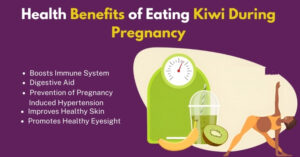
Nutrients in kiwi like folate, vitamin C, and potassium play a big role in fetal growth and development. Folate is even more crucial in the first trimester because it avoids neural tube birth defects and supports healthy cell division. It is rich in folate content so it meets the nutritional needs of a pregnant woman during this critical moment.
Boosts Immune System
Pregnancy tends to make women physically weak and susceptible to infections. The best explanation for this is that kiwi has a high vitamin C content which acts as an immunity booster. Vitamin C promotes the synthesis of white blood cells that help combat infections. Moreover, it enhances the absorption of iron from plant foods, therefore, decreasing the chances of iron deficiency in pregnant women, especially in the very early stages.
Digestive Aid
Pregnancy hormones slow down the digestive tract during digestion, causing constipation and bloating. This can be alleviated with kiwi fibre, which aids regular bowel movement to prevent indigestion and subsequently provides relief for discomfort during pregnancy caused by digestive issues.
Prevention of Pregnancy Induced Hypertension
Pregnancy-induced hypertension, or gestational hypertension, is the elevation of blood pressure that occurs during pregnancy. Potassium in the kiwi prevents high amounts of potassium. It maintains normal blood pressure and healthy circulation. High blood pressure should be maintained during pregnancy because it can lead to many dangerous ailments like preeclampsia, which is very dangerous for the mother and her unborn baby.
Improves Healthy Skin
Pregnancy changes the skin most of the time and may have birthmarks or pigmentation. Kiwi is rich in vitamin C and antioxidants, which help the skin remain healthy without stretch marks and acne by boosting collagen production and reducing oxidative stress. Vitamin C also protects the skin against damage from UV rays and the environment.
Promotes Healthy Eyesight
Kiwi has carotenoids such as lutein and zeaxanthin, which are effective for eye health. These antioxidants protect the eyes against damage by oxygen from intense blue artificial light and UV rays. An expectant woman can eat kiwi to prevent possible eye defects not only for herself but also for the baby once born.
People Also Search: best ivf center in ahmedabad | best ivf doctor in vadodara
Possible Concerns and Side Effects of Kiwi Fruits for Pregnancy
It can be said generally that kiwi is safe for a pregnant woman to consume. But then again, there are these considerations:
Allergies
Kiwi in pregnancy can cause allergies in some people. Allergy symptoms caused by kiwi may be very mild to severe. It can cause itching, swelling, or even difficulty in breathing. A pregnant woman who knows her allergy to kiwi or any other fruit in the same family such as papaya, banana, or avocado must avoid eating kiwi.
High Sugar Content
Kiwi is nutritious indeed; it is naturally sugar-rich. Hence, a pregnant woman’s diet should carefully observe whether they have gestational diabetes or face the risk of developing it. They should consult their gynaecologist regarding the intake of kiwi and other sweet fruits in larger amounts.
Oxalates
Kiwi fruits contain oxalate which is a compound that may bind calcium and some other minerals. This compound is related to the formation of kidney stones in predisposed individuals. Kiwi doesn’t have high oxalate levels compared to spinach and other foods. Anyone who has a history of kidney stones should thus inquire from their health provider before consuming a lot of kiwi.
How to Incorporate Kiwi in Pregnancy Diet
Kiwi is one fruit which one can enjoy at all times, whether in a meal or a snack. Here is how one can take kiwi in pregnancy:
Smoothie: Mash kiwi together with other fruits such as banana and strawberry, and mix also with spinach for a smoothie full of nutrients.
Salad: Add slices of kiwi into fruit salads or green salads for a flare of flavour and also vitamins.
Yoghurt: Have it alone or with granola or nuts on top of plain or Greek yoghurt with kiwi for your healthy snack.
Snacking: Peel and slice for a very quick, easy, take-along snack.
Desserts: Use kiwi as a fresh and healthy topping over cakes and tarts or just as a warm pudding.
Conclusion:
Kiwi is one of the powerhouse fruits that contain every vitamin, mineral, other big antioxidants, and fibre. This is the best fruit that could be eaten by a pregnant woman who wants to have her health well maintained during the whole pregnancy period and even beyond. The vitamin C, folate, potassium, and fibre content make it very valuable and essential for diet during pregnancy, and that is rightly in a balanced way.
Apart from that, kiwi is generally safe with a wide range of health benefits, but there are specific safety precautions to keep in mind, such as allergies or the possibility of developing kidney stones. Thus moderation takes care of any above suggested risks, as well as letting the taste and health benefits of kiwi during pregnancy.
Kiwi form an appetizing, nutrient-rich fruit for pregnant women that nourishes effectively the pregnant woman and the unborn. With its great nutrient profile, particularly high vitamin C, folate, and antioxidant contents, it becomes a must-have in a diet healthy for pregnancy. Proper restriction and knowledge of the possibilities of adverse effects make kiwi a fruit worth inclusion in a diet during the day. To optimize overall fertility and health during pregnancy, seeking guidance from Nimaaya IVF Center and consulting our expert Dr Pooja Nadkarni can further enhance nutritional choices, ensuring both the mother’s and baby’s needs are met effectively.

